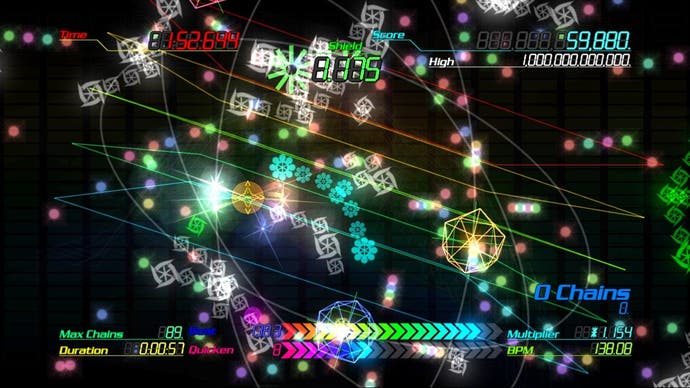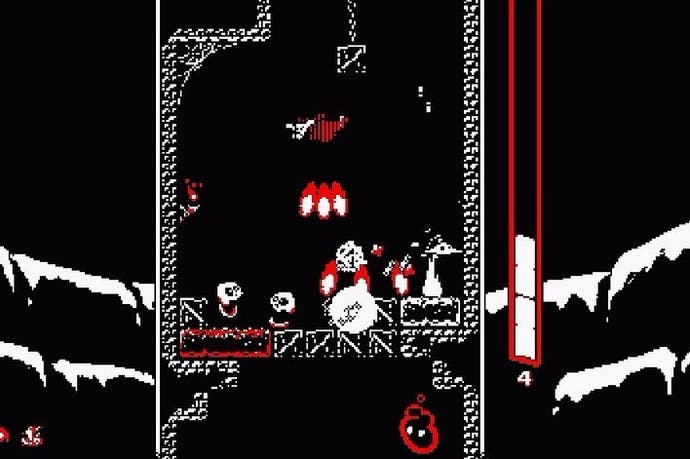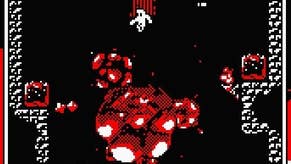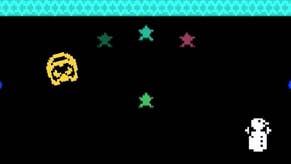How games helped me finish my master's
Let's hope it goes Downwell.
Before you ask, no, I'm not happy to have 'finished' my master's dissertation. But if you'd like to ask 'hey, aren't you just glad you were too tired to read the shameful stream of word incontinence you sent in one minute before the deadline?' Then the answer is: 'Why yes! Thanks for asking!'
And if I'm being honest, after a few years of practical work in hospitals, it felt pretty good to be engrossed in proper bookish study for a change, to once again dust off my impenetrably mysterious Creative Process (half-hourly fridge visits, sporadic shaving etc.). I also played a lot of Downwell.
I've been playing the tight little platform-shooter on my phone - though it's on other platforms too - and its hypnotic rhythm of free-falling and firing would feel great even without work to avoid. But because it's so instantly satisfying, it's also become my go-to fix of catharsis, nicely punctuating my study sessions in two ways.
Firstly, as a quick breath, a needed pause in the flow of new ideas whilst reading and ruminating. Like a psychological comma, a semi-colon or - rather too often - a full-stop. A full stop with lots of blank space afterwards (My Creative Process okay!).
But it's also punctuation in the way it gives needed rhythm and form to otherwise pretty overwhelming trains of thought. In particular I've noticed that it's just at the eureka moment of a new idea, or soon after a sudden dawning of comprehension, that I instinctively reach for my phone and some Downwelling.
Not only as a reward or relief, but also because when the clouds of confusion part and the bright rays of understanding burst through, it can actually be too bright to stare at directly. New Ideas that can only be looked at in reflection, or slightly askew. So I grab my phone to be quickly engaged in Downwell's rhythmic spelunking, whilst the naked thoughts at the edge of sight can start making themselves a bit more presentable and palatable, trying on different words like garments, settling in and making tentative approaches towards the (rather cliquey) groups of thoughts lazing around my head.
To the focussed and efficient this probably sounds a lot like dressed-up procrastination, no different to checking Facebook between writing 'paragraphs' (sentences). To others it might sound like I'm damning Downwell with weirdly faint praise, basically comparing it to other advanced thinking tools like Having Long Showers, or Driving Alone Whilst Listening To Music and so on.
But if your Creative Process ™ is as nebulous, diffuse and porous as mine ('unproductive' to the unenlightened), then you end up becoming very, very familiar with a game. You start forming that intuitive understanding of its systems and subtleties; absorbed until automatic, understood at a subconscious level. Like how I played Mario Kart 64 so much when younger, that I could eventually hold whole conversations with a mate on the phone and still come first in Wario Stadium without remembering anything about the race. Or like the original Every Extend, which I played alongside my first-year medical school revision during the Christmas holidays of 2006, its nuances and strategies only visible when familiar with it enough to play without thinking too much, like those optical illusion that reveal themselves when your eyes lose focus.
Now, the association between playing it and that particular time and place are pretty enmeshed, and I can't think of the robotically voiced 'Every. Extend' without also remembering long winter evenings of lamp-lit study, and the girl I fancied at the time. People often talk about games as escapism, or of the absorption of being in 'the zone', but I reckon they're also at their best when unexcitingly familiar, like breaking in a pair of shoes until you're not aware of them anymore. When playing them is not a break from, but an extension to thinking as-usual, as if the screen edges that contain them have leaked a little.
In that sense, I would say I've gotten to know Downwell pretty well. Along with perhaps The Life of Pablo, it's probably the cultural product I've replayed the most this year - able to feel even the slightest variations, like the first throat tickle of a brewing cold. But whereas the various changes to The Life of Pablo - some for the better, some less so (he shouldn't have 'fixed' Wolves) - gave a sense of Kanye West's creative decision-making in ways more direct than any interview, in games there is a different kind of understanding possible.

I think it was only by mastering its systems could I start to appreciate Downwell as something other than an inevitable, fully-formed whole; that I could appreciate the many small decisions that its clockwork systems were crafted from. The just so bounce of a turtle shell. The silent respite of the bubbled alcoves. The complete inversion of the game rhythm that the knife and fork introduce and the general, undiminishing satisfaction of jumping on the bastard frogs just before they leap. It's only by engaging with Downwell's mechanics that you start to really understand something of its creation.
This was hammered home to me recently in a different type of Important Work Break, when I watched Indie Game: Life After, the epilogue to the Indie Game: The Movie documentary. In it Derek Yu - the famed creator of that other acclaimed indie caving game - says that 'Once you get really good at Spelunky, and you understand how it works... then you're really starting to think how I think about the game. And in a game like Spelunky where I'm not specifically putting myself into a character... once you start to think about how the game works or understand it at that level of complexity where you're seeing how all these elements work together... then we are starting to have a connection as me as game designer and you as a player'.
It made me think about the real life friendships and personal connections I enjoy, and those great, meandering conversations into which you fire off thoughts and they're bounced back clarified, complicated or new. And it's made me think about my Downwell games not just as fun reprieve (though they are), nor as a separate mental space for new thoughts and epiphanies to arise from (though it is), but also as a curious proxy conversation with its designer Ojiro Fumoto; one not based in language but in systems and process, but still able to foster new thoughts and ideas. For better or for worse, playing games has often been a part of my working routine, and I remember them as tied to the times as Wind Waker is to my A-Level summer, or Every Extend is to that first winter back home from uni. For this year I'll remember playing Downwell, for its collaboration and conversation. The summer friend in none of the photos.












